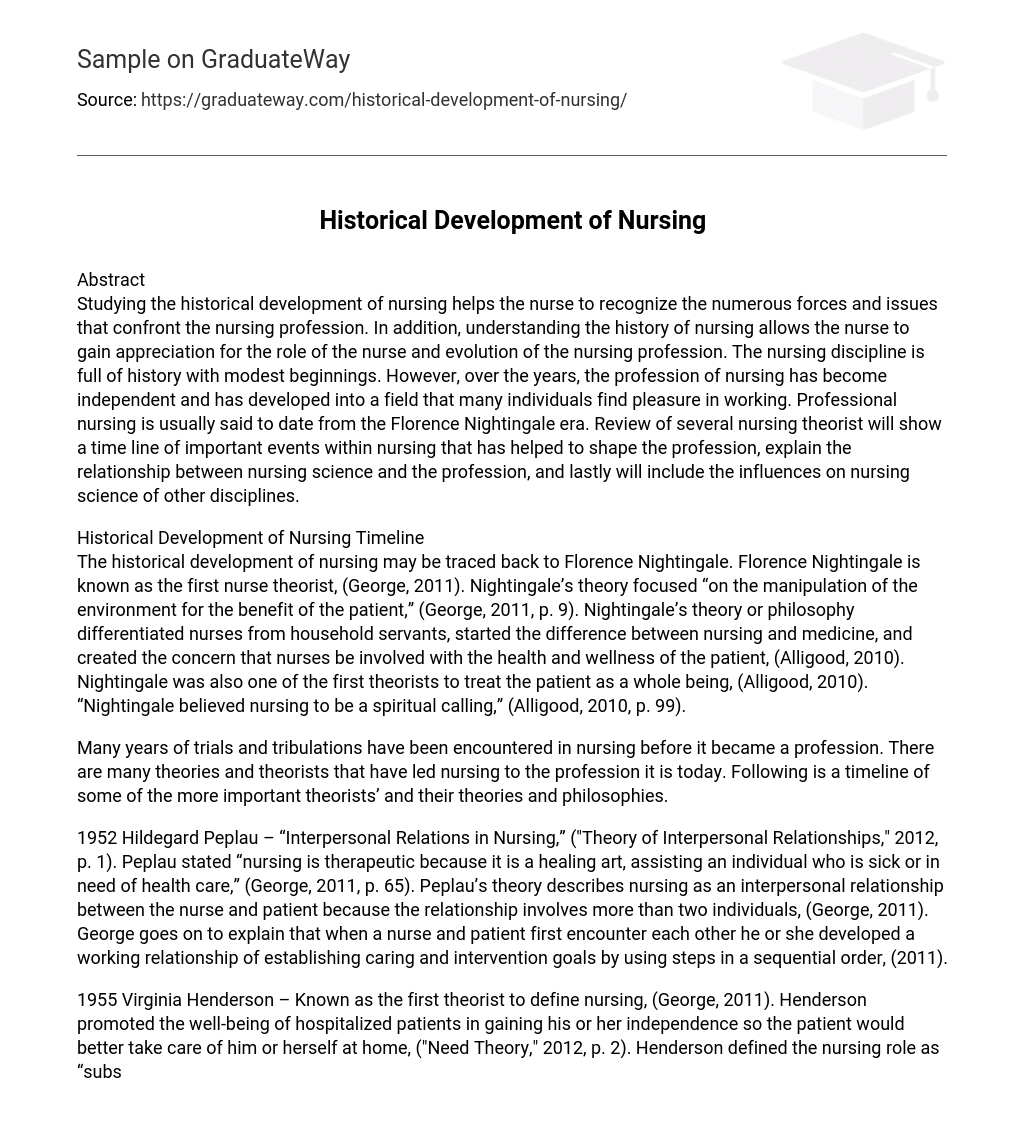Abstract
Studying the historical development of nursing helps the nurse to recognize the numerous forces and issues that confront the nursing profession. In addition, understanding the history of nursing allows the nurse to gain appreciation for the role of the nurse and the evolution of the nursing profession. The nursing discipline is full of history with modest beginnings. However, over the years, the profession of nursing has become independent and has developed into a field that many individuals find pleasure in working in. Professional nursing is usually said to date from the Florence Nightingale era. A review of several nursing theorists will show a timeline of important events within nursing that have helped to shape the profession, explain the relationship between nursing science and the profession, and lastly, will include the influences on nursing science of other disciplines.
Historical Development of Nursing Timeline
The historical development of nursing may be traced back to Florence Nightingale. Florence Nightingale is known as the first nurse theorist (George, 2011). Nightingale’s theory focused on the manipulation of the environment for the benefit of the patient (George, 2011, p. 9). Nightingale’s theory or philosophy differentiated nurses from household servants, started the difference between nursing and medicine, and created the concern that nurses be involved with the health and wellness of the patient (Alligood, 2010). Nightingale was also one of the first theorists to treat the patient as a whole being (Alligood, 2010). Nightingale believed nursing to be a spiritual calling (Alligood, 2010, p. 99).
Many years of trials and tribulations have been encountered in nursing before it became a profession. There are many theories and theorists that have led nursing to the profession it is today. Following is a timeline of some of the more important theorists and their theories and philosophies.
1952 saw the publication of Hildegard Peplau’s Interpersonal Relations in Nursing” (“Theory of Interpersonal Relationships,” 2012, p. 1). Peplau stated that “nursing is therapeutic because it is a healing art, assisting an individual who is sick or in need of health care” (George, 2011, p. 65). Peplau’s theory describes nursing as an interpersonal relationship between the nurse and patient, as the relationship involves more than two individuals (George, 2011). George goes on to explain that when a nurse and patient first encounter each other, they develop a working relationship of establishing caring and intervention goals by using steps in a sequential order (2011).
1955 Virginia Henderson is known as the first theorist to define nursing (George, 2011). Henderson promoted the well-being of hospitalized patients by helping them gain independence so they could better take care of themselves at home (Need Theory,” 2012, p. 2). Henderson defined the nursing role as “substitutive” (doing for the person), “supplementary” (helping the person), and “complementary” (working with the person), with the goal of helping the person become as independent as possible (“Need Theory,” 2012, p. 2).
In 1971, Dorothea Orem developed the Self-Care Deficit Nursing Theory. According to Orem’s theory, all patients want to care for themselves, and they will be able to recover more quickly and holistically by performing their own self-care as much as they are able (George, 2011). In some situations, patients are encouraged to be more independent. This can be especially true in rehabilitation settings, in which patients are transitioning out of being cared for by physicians and nurses and back home to exclusive self-care. In these cases, the Self-Care Deficit Nursing Theory can be applied to help patients be more independent and prepare to be released from the healthcare facility where they are being cared for.
Nursing Science and the Profession
Practicing nursing as a profession is based on nursing science, which is a body of knowledge developed through the formulation of theories. These theories guide both research and practice with the goal of promoting patients’ well-being. Nursing science and professional practice include the integration of nursing knowledge from the broad conceptualizations of the nursing models to the level of practice theory. Nursing is a profession because it provides extended education for its members. Nursing provides service to society. Nursing is a profession because it protects each professional member by using its own rules and regulations to practice effectively. Nursing has its own unique body of knowledge, values, and code of ethics. The influence of Nursing Science and other Disciplines
Nursing science, in general, has a huge influence on other disciplines. It plays a vital role in fulfilling their respective purposes. For example, nursing has ties with psychology itself. The science of nursing, in this regard, is applied when psychologists and even psychiatrists deal with their clients. In psychology, assessing the needs of clients is an important step to determine appropriate treatment. Most nursing theories focus on client needs, thus psychology implements the same principles. Another area is the use of therapeutic communication for both nursing and psychology. This is essential to both disciplines in executing plans of care. In psychiatric nursing, therapeutic communication is the main tool for patient-nurse interactions. In psychology, therapeutic communication is also key in probing through the client’s personal problems and issues regarding trust. In conclusion,
As nurses, we should be proud of our nursing history. Although it had to go through many hardships such as wars, plagues, and disasters, these events have molded the nursing science to be stable and strong in its foundation. The history of nursing has evolved to make the profession better and continues to grow for further improvement. Nursing, being an interdisciplinary occupation, will always be essential in society as it renders its services in the healthcare system. These theories throughout time will continue to guide nurses to become competent in both skills and knowledge as they fulfill their roles as healthcare providers.





